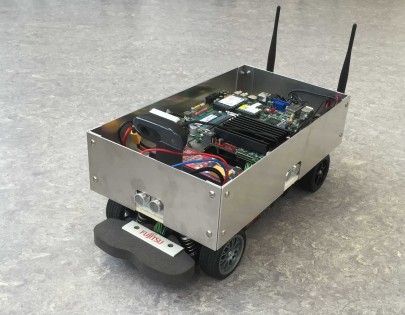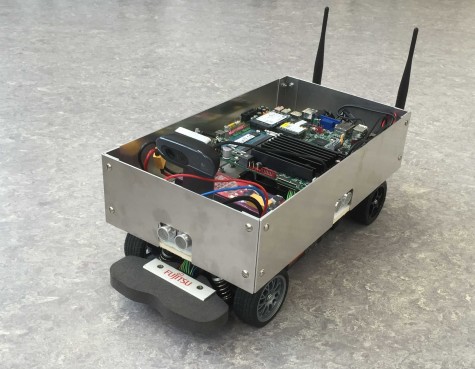General information
| Contact person | Dr.-Ing. Eric Lenz |
| Registration | Registration takes place via TUCaN. If there are more registrations than places, places will be allocated according to the procedure described on this page. |
| Introductory event | The compulsory introductory event takes place in the first week of lectures in the winter semester. The exact date and location can be found below. |
| Recognition as ADP (FB16) | Thanks to the cooperation with the fzd Department, students from the Department of Mechanical Engineering have the opportunity to have this project seminar recognized as ADP. Please contact Kristof Hofrichter for this. |
Content of the project course
In this project seminar, teams of students from different fields of study will work on tasks relating to autonomous driving. The tasks are to be organized as a project so that the independent organization, planning and implementation of a comprehensive task in a team can be practiced.
Model cars with the following equipment are available:
- Intel Realsense i455 camera with depth image.
- Several sensors: ultrasound, Hall wheel encoder, inertial measurement unit (IMU)
- Microcontroller board (in-house development) to control the sensors and actuators (motor, steering).
- Intel NUC computer (i5, 12th gen.) with Xubuntu operating system and the Robot Operating System (ROS), which makes it possible to process the sensor data and use the publish-subscribe pattern to handle exciting (and sometimes computationally complex) tasks in the field of autonomous driving.
The tasks to be mastered are, for example:
- Lane keeping
- Time trial
- Avoiding obstacles
Special control engineering issues are
- driving control itself (lane keeping),
- related to this, the estimation of the driving status (use of data from ultrasonic sensors, acceleration and angular rate sensors, camera data) and
- path planning.
Due to the many, sometimes complex areas involved in solving the tasks (image processing, use of depth data, path planning, …), it is not possible to create everything from scratch. However, this is not necessary and it is precisely the aim of this project seminar to learn how to work sensibly with existing software packages and how to extend them.
It is therefore necessary to analyze which functionalities are required. After reviewing existing software packages, a decision must be made as to where existing resources should be used and which algorithms and functionalities should be developed and implemented in-house.
This is also the motivation for carrying out this project seminar in cooperation with information systems engineers (who have skills in setting up and working with more complex software structures) and control engineers (who have skills in system analysis and controller design).
Tasks
The tasks are always divided into a compulsory and an optional part, whereby the compulsory part must be completed by all groups. The compulsory part is intended to provide an introduction and the first steps into the platforms. The optional part can then be defined, expanded, supplemented or changed according to the group and their interests. It is also possible to contribute your own suggestions for topics.
Mandatory task:
To complete a circuit as quickly (and autonomously) as possible.
Ideas for optional topics:
- Entering and exiting parking spaces: Parking into and out of parallel or perpendicular parking spaces.
- Sign recognition: Recognizing signs next to the road and reacting accordingly.
- Obstacle detection: Avoiding obstacles on the road.
- Advanced road conditions: Reacting to new road conditions such as intersections, turning lanes, crosswalks, missing lane markings, …
- Pedestrians: Stop at a crosswalk and wait until a pedestrian has crossed the crosswalk.
Organization
Registration/Grouping
We will accept five groups of six people each for this project seminar. As the number of participants is limited, the following procedure will be used to allocate the project seminar places.
Step 1
Register in TUCaN and enroll yourself in the special Moodle course for registering.
Step 2
Everyone interested must fill out the questionnaire for the allocation of places in Moodle. The questionnaire is available from 01.09., 10:00, to 6.10., 23:59. Based on this questionnaire, the places will then be allocated according to the procedure described in step 3. Among other things, the time of completion plays a role!
Step 3
We allocate the project seminar places internally and announce who has been allocated a place by 09.10. at the latest. The following procedure is used to allocate places.
There is a maximum number of places for each of the following study programs/specializations:
- Student group 1: ETiT (DT) and iST (Bachelor or Master): 2 places per group
- Student group 2: ETiT (AUT) and Mechatronics (Bachelor or Master): 2 places per group
- Student group 3: Mechanical engineering (Bachelor or Master): 1 – 2 places per group
- Student group 4: Computer Science (Bachelor or Master), Master Autonomous Systems or other degree programs: 1 – 2 places per group
At least one student from each student group will be selected for each group. If the places for the individual student groups are not fully allocated, the remaining places can be allocated to other student groups from the above list.
The points achieved in the Moodle questionnaire are used as the basis for allocating places. The following scheme is used:
- For study programs from one of the student groups, 5 points are awarded for Bachelor students and 3 points for Master students.
- 1 point is awarded for each subject area in which passed courses have been attended. Other courses can also lead to 1 point (after examination) if they cover other subject areas for which no points have yet been awarded. A maximum of 3 points can be achieved.
- Various other activities in the field of autonomous driving, e.g. active participation in the TU Racing Team or a HiWi job, if this fits the subject area of the project seminar, can earn a maximum of 1 point after examination.
In the event of an equal number of points, the principle of “first come, first served” will be applied within a student group, with the submission of the questionnaire in Moodle being counted as the time of registration.
We reserve the right to give lower priority to students who have withdrawn from a place in the project seminar when allocating places again.
Step 4
Participants accepted for the project seminar MUST attend the introductory event. If someone is unable to attend, they must let us know in advance.
Competition and demonstration
At the end of the project seminar, all groups compete against each other in a circuit (compulsory task) and can put their approach into practice against the other groups. The optional tasks are presented in short demonstrations by the individual groups.
Further information and materials
Further information and materials can be found in the Moodle course.
Important dates
| Date/Time | Location | Event |
|---|---|---|
| 01.09. – 06.10. | Moodle | Fill in the Questionnaire to allocate a place |
| 09.10. | Moodle | Announcement of the places |
| 14.10., 15:15 – 16:00 | S3|11-0012 | Introductory event (mandatory) |
| 31.10., 23:59 | TUCaN | Registration and deregistration for the module/event and examination |
| 09.12., 8:45 – 11:30 | S3|21-1 | Intermediate presentations |
| 04.03., 9:50 – 12:25 | S3|21-1 | Final presentations |
| 05.03., 9:50 – 12:25 | Project seminar room | Demonstrations |
| 11.03., 23:59 | Moodle | Submission of the papers |




